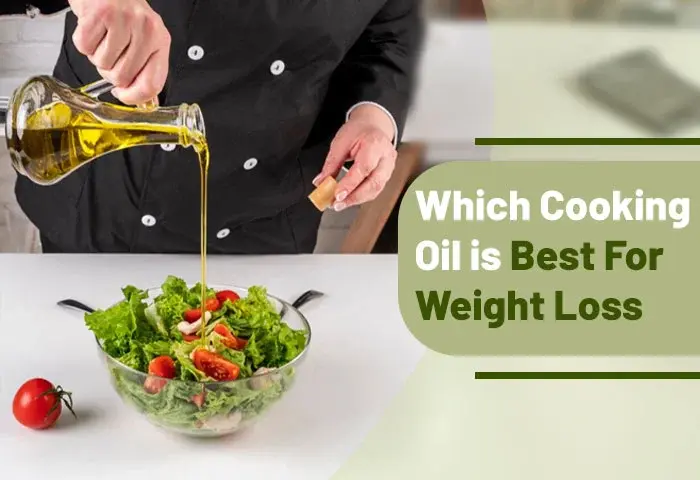In the pursuit of a healthier lifestyle and a successful weight loss journey, every choice we make in the kitchen plays a pivotal role. While we meticulously plan our meals, calorie intake, and exercise routines, one often overlooked aspect that can significantly impact our weight loss goals is the choice of cooking oil. Yes, you read it right – the type of oil you use can make or break your efforts to shed those extra pounds.
In this blog, we have explained the essential topic of cooking oils and their profound influence on weight loss. Many of us are unaware that not all cooking oils are created equal, and each has a distinct impact on our health and waistline. From olive oil to coconut oil, canola oil to avocado oil, the options seem endless, and the consequences of our choices are far-reaching.
Discover how different oils play unique roles in our bodies and metabolism, and learn valuable insights that can empower you to make informed decisions in the kitchen. After all, it’s not just about what you eat but also about how you prepare your food that contributes to achieving your weight loss aspirations
Understanding Healthy Fats
Differentiating between Healthy Fats:
- Monounsaturated Fats: Monounsaturated fats, found in foods like olive oil, avocados, and nuts, are celebrated for their heart-healthy properties. Research suggests that these fats can help lower bad cholesterol levels while maintaining or even increasing good cholesterol levels, thus promoting cardiovascular health.
- Polyunsaturated Fats: Polyunsaturated fats, including omega-3 and omega-6 fatty acids, are essential for the body. Sources like fatty fish, flaxseeds, and walnuts provide these fats, which are known to support brain function and reduce inflammation.
Unhealthy Fats:
- Saturated Fats: On the flip side, saturated fats, commonly found in red meat, full-fat dairy, and tropical oils, have been linked to increased levels of LDL (bad) cholesterol. Excessive consumption of saturated fats is associated with an elevated risk of heart disease, making it crucial to moderate intake.
- Trans Fats: Perhaps the most notorious of the bunch, trans fats are artificially created through the process of hydrogenation, often found in processed and fried foods.
Impact on Metabolism and Satiety:
- Metabolism Boost: Healthy fats play a significant role in supporting metabolism. Monounsaturated and polyunsaturated fats, in particular, aid in the efficient burning of calories, contributing to weight management. These fats are also known to enhance insulin sensitivity, which is crucial for regulating blood sugar levels.
- Satiety Signals: Including healthy fats in your diet can help you feel fuller for longer. Unlike refined carbohydrates, which can cause energy spikes and crashes, healthy fats provide sustained energy and trigger satiety signals. This can be particularly beneficial for those aiming to control their appetite and make better food choices.
Role of Cooking Oils in Weight Loss
Satiety and Overeating Prevention:
- Oils provide a sense of fullness, curbing the likelihood of overeating and unhealthy snacking.
- Feeling satisfied after meals reduces the temptation to indulge in calorie-laden snacks.
Metabolic Benefits and Calorie Burning:
- Certain oils offer metabolic advantages, aiding in calorie burning and body fat reduction.
- Medium-chain triglycerides (MCTs) in some oils boost metabolism, converting easily into energy and minimizing fat storage.
Cravings Control:
- Choosing the right oils helps regulate blood sugar levels, reducing cravings for sugary and high-carbohydrate foods.
- By incorporating these oils, you can mitigate the urge to snack between meals.
Essential Fatty Acids for Improved Metabolism:
- Oils contain essential fatty acids that enhance metabolism and facilitate fat burning.
- Omega-3 fatty acids in certain oils contribute to increased fat-burning and reduced inflammation in the body.
Digestive Health and Nutrient Absorption:
- Some oils with healthy fats lubricate the digestive tract, promoting the smooth movement of food through the body.
- Improved digestion prevents issues like constipation, supporting overall weight loss efforts.
Rich in Fat-Soluble Vitamins:
- Oils are a source of fat-soluble vitamins (A, D, E, and K), crucial for overall health and well-being.
- Including these vitamins in your diet through oils supports essential bodily functions and aids in weight management.
Best Cooking Oils for Weight Loss
Olive Oil:
Extra virgin olive oil stands as a cornerstone for fostering a healthy lifestyle. Laden with monounsaturated fats and medium-chain triglycerides not only aids in cholesterol reduction but also supports weight loss and management. Numerous studies underscore the weight loss potential of MCTs, making extra virgin olive oil a valuable addition to your diet, best enjoyed in salads, pasta, soups, or drizzled over pizza and veggies.
Rice Bran Oil:
Rice bran oil boasts high levels of vitamin E and antioxidants that accelerate metabolism and aid weight loss. Rich in monounsaturated fatty acids, it not only reduces cholesterol but also adds a nutty flavor to your dishes. With a high smoke point, it’s perfect for stir-fries and deep-fried delights, making it a health-conscious choice for cooking oil.
Click here to learn why top chefs and nutritionists recommend our Rice Bran Cooking Oil. Elevate your meals and your well-being with one click!
Coconut Oil:
Aiding weight loss through a combination of fatty acids and metabolism-boosting enzymes, coconut oil impresses as a top choice. It suppresses appetite and prolongs satiety, and its medium-chain triglycerides (MCTs) contribute to efficient fat burning. Despite its saturated fat content, moderation is key when using it for cooking. The extra calories from coconut oil don’t convert into stored fat, making it an ideal cooking companion for those on a weight loss journey.
Canola Oil:
Renowned for its heart-healthy properties, canola oil is low in saturated fat and promotes cardiovascular health. Studies indicate a reduction in belly fat with regular consumption. Packed with monounsaturated fatty acids and omega-3s, its versatility shines in cooking, dressing, grilling, sautéing, and more.
Avocado Oil:
Packed with monounsaturated fats and oleic acid, avocado oil stands out as a culinary powerhouse. Research highlights its role in reducing belly fat and lowering the risk of metabolic syndrome. Beyond weight loss, it enhances metabolism, providing energy efficiently.
Cooking Tips for Weight Loss
- Proper Storage Matters: Maintain oil quality by storing them in a cool, dark place to prevent rancidity.
- Moderation is Key: Despite their health benefits, oils are calorie-dense. Use them judiciously to avoid excessive calorie intake.
- Healthy Cooking Techniques: Prioritize grilling, baking, and roasting over frying for healthier meal preparation.
- Embrace Creativity: Explore diverse oils and cooking methods to discover your preferred combinations. Experiment with homemade salad dressings, marinades, and dips to add a touch of innovation to your culinary repertoire.
- Steer Clear of Pitfalls: Avoid using oils at high temperatures, which can compromise their integrity and create harmful compounds. Refrain from consuming oils that have turned rancid, as they pose potential health risks.
The Importance of Balanced Nutrition
- Holistic Approach to Weight Loss:
Achieving lasting and meaningful weight loss extends beyond mere calorie counting. A holistic approach, encompassing a balanced diet and regular exercise, stands as the cornerstone for sustainable success. Rather than opting for quick fixes, prioritize a lifestyle transformation that nurtures your body from within.
- The Power of a Balanced Diet:
A balanced diet is not just a buzzword; it’s a roadmap to overall well-being. It ensures your body receives the essential nutrients, vitamins, and minerals it craves. Strive for a colorful plate, incorporating a variety of fruits, vegetables, lean proteins, and whole grains. This diversity not only aids in weight management but also supports optimal health in the long run.
- Regular Exercise as a Catalyst:
Exercise is not just a means to burn calories; it’s a catalyst for holistic wellness. Regular physical activity boosts metabolism, enhances mood, and contributes to muscle toning. Combining exercise with a balanced diet creates a powerful synergy, amplifying the effectiveness of your weight loss journey.
- Personalized Guidance is Key:
While general advice forms a foundation, the nuances of each individual’s body and lifestyle require personalized attention. Consult with a qualified dietitian or nutritionist to tailor a plan that aligns with your specific needs and goals. Their expertise can provide valuable insights, ensuring your journey to better health is not only effective but also sustainable.
- Sustainable Habits for Lifelong Results:
Quick fixes may yield rapid results, but the key lies in cultivating sustainable habits. A balanced diet and regular exercise routine become integral components of your lifestyle, fostering not just weight loss but overall vitality.
Parting Thoughts
Opting for the right oils in your quest for weight loss isn’t just about shedding pounds; it’s a crucial step toward enhancing your overall health and well-being. Integrating the top oils for weight loss into your daily diet can be a simple and enjoyable strategy to not only trim down but also elevate your overall health.
By practicing moderation and skillfully combining these oils with other wholesome foods, you can craft meals that are both delicious and nutritionally potent, fostering weight loss while delivering a myriad of health benefits. Whether you’re embracing the heart-healthy attributes of olive oil or tapping into the metabolism-boosting prowess of coconut oil, the incorporation of these oils into your culinary repertoire serves as a flavorful and effective avenue to realize your weight-loss aspirations.
So, why delay? Start today and enjoy the benefits these SVR oils can bring to your weight loss and overall well-being.
Source reference:-
- Saturated Fat in Relation to Unsaturated Fats, Carbohydrate Sources and Coronary Heart Disease Risk
https://www.ncbi.nlm.nih.gov/pmc/articles/PMC4593072/ - A summary of the data from systematic reviews and meta-analyses regarding the relationship between monounsaturated fatty acids and the risk of cardiovascular disease
https://www.ncbi.nlm.nih.gov/pmc/articles/PMC3546618/ - The importance of the ratio of omega-6/omega-3 essential fatty acids
https://pubmed.ncbi.nlm.nih.gov/12442909/#:~:text=Abstract,%2F1%2D16.7%2F1. - Effects of medium-chain triglycerides on weight loss and body composition: a meta-analysis of randomized controlled trials
https://pubmed.ncbi.nlm.nih.gov/25636220/
FAQ’s
Q: Which oil is best for health?
A: The best oil for health is extra virgin olive oil. It is rich in monounsaturated fats and antioxidants, promoting heart health and offering various health benefits.
Q: What is the healthiest oil to cook with?
A: Extra virgin olive oil is often considered one of the healthiest oils for cooking. Its rich monounsaturated fats and antioxidants make it heart-healthy, and it has a lower risk of breaking down at high temperatures compared to other oils.
Q: Ghee or oil which is better for weight loss?
A: Both ghee and oil can be part of a balanced diet, but moderation is key. Opt for healthier oils like olive or avocado oil, and consider portion control. Ghee, while flavorful, is calorie-dense, so use it sparingly in a well-rounded weight loss plan.

